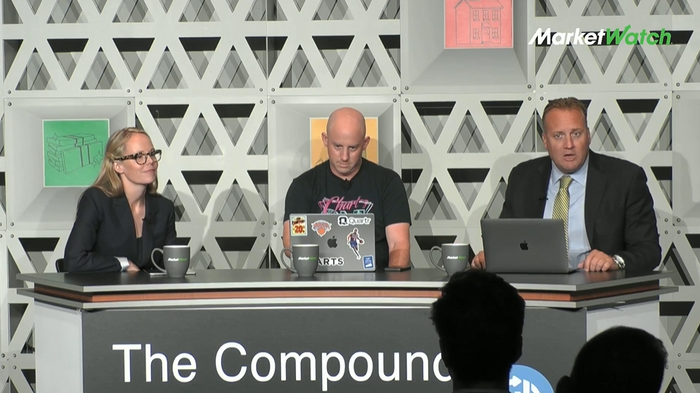““You can’t have a recession if people still have their jobs, and have no problem getting your next job. So I don’t care what the NBER says … If people don’t get fired, then it’s not a recession. “”
That was Josh Brown, chief executive officer of Ritholtz Wealth Management, joining his “The Compound & Friends” investing podcast cohost Michael Batnick onstage at MarketWatch’s Best New Ideas in Money festival on Thursday.
Brown, the CNBC personality whose New York City-based investment advisory firm manages more than $2 billion, spoke with MarketWatch news editor Joy Wiltermuth about whether a recession is pending, and the red flags he’s been seeing in the U.S. economy right now — but also, why this is also an opportunity for investors to buy into the market, even if it doesn’t feel like it right now.
“It seems like a slow-motion recession that everyone knows is coming, but it has failed to show up in the data,” said Brown.
Batnick, who is a managing partner at Ritholtz Wealth Management and runs “The Irrelevant Investor” blog, added that, “The consumer is in good shape.” He pulled up several charts to illustrate that most Americans are still paying their bills on time, and that many people’s personal balance sheets are better now than they were before the pandemic. Both men also noted that employment numbers have been strong. “The data is saying that the consumer is in good shape,” he repeated.
And Brown joked that Fed chair Jerome Powell’s decision to get aggressive against inflation by raising the benchmark federal-funds rate by 0.75 percentage points on Wednesday reminded him of a student trying to get extra credit after procrastinating to turn in any work all year.

MarketWatch editor Joy Wiltermuth (left) with Michael Batnick (center) and Josh Brown of Ritholtz Wealth Management.
MarketWatch
“Jerome Powell is like the guy that missed all of his homework assignments the whole year, and then as a treat for the teacher, on the last day of school he comes in and he’s written a rock opera, and he’s gonna perform it,” he said, getting a big laugh from the crowd.
But on a more serious note, both men agreed that the housing market “is flashing in bright red” right now, with Brown saying, “If you’re worried about housing, you’re worried about the right thing.”
And he said that’s because housing touches on so many different parts of the U.S. economy outside of real estate, including lending and financial institutions, construction and renovation, as well as legal work. “It’s been said anywhere between 15% to 18% of the U.S. economy has something to do with housing,” he said.
““If you’re worried about housing, you’re worried about the right thing.” ”
Brown added that the housing market madness peaked with the “Saturday Night Live” Zillow sketch that compared swiping through real estate listings with looking at porn. “It was a great skit,” Brown said. “I think they really put their finger on what the zeitgeist was [during 2020 COVID shutdowns], when there was nothing else to do except look at how much better your neighbor’s house was and fantasize about it, because we were trapped inside these four walls.”
On the flip side, Brown and Batnick suggested that a recession could be bullish for commercial real estate, as worried employees — especially those working in the financial industry — could feel too insecure to keep “quiet quitting” or demanding that they continue to work from anywhere. A recession could drive worried workers back into to the office again, and give employers some of their leverage back.
“Last year was an environment in which you could stick up a middle finger to your boss if you were in finance. A lot of people were like, ‘Hey you know what, actually, I’m gonna be in the Hamptons this summer. This is where I do my job from now,’” said Brown.
“In a recession, it’s sing for your supper again,” he continued. “And you want face-time with your boss, and you want to be in the peripheral vision of the executives. So paradoxically, the best thing that could happen for a company, assuming their own balance sheet is OK, is a recession — especially in finance, because then all of a sudden, you’ll see buildings fill up with employees again very quickly.”
And Brown noted that while many investors and consumers are feeling “unhappy” and spooked by the headlines right now, it’s actually a prime time to invest in the market while so many stocks are priced lower than they have been in years. He called it the “paradox” of investing.
““Just appreciate the moment that you’re in. It doesn’t feel great, but the opportunities are presenting themselves now.” ”
“It’s always gonna feel the best at the worst possible time, and it’s always gonna feel the worst at the best possible time,” he said. “Just appreciate the moment that you’re in. It doesn’t feel great, but the opportunities are presenting themselves now.”
“The Reformed Broker” session featuring Brown and Batnick was just one of the many events at MarketWatch’s inaugural Best New Ideas in Money Festival this week. MarketWatch’s top editors have been hosting Q&As with investing legends and entrepreneurs like Carl Icahn and Ray Dalio to tease out their financial advice. And there have been sessions covering hot sectors like crypto and cannabis, workshops to manage your money like a pro, and more.
Get insights on investing and managing your finances. Speakers include investors Josh Brown and Vivek Ramaswamy; plus, topics such as ESG investing, EVs, space and fintech. The Best New Ideas in Money Festival continues Thursday. Register to attend in person or virtually.
You can also subscribe to MW’s YouTube channel to catch full session videos.
